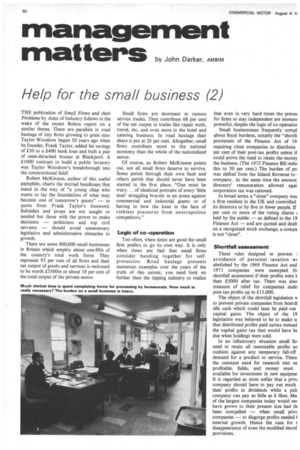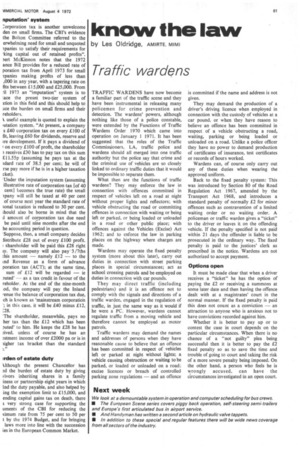management
Page 62

Page 63

If you've noticed an error in this article please click here to report it so we can fix it.
matters by John Darker AMB M
Help for the small business (2)
THE publication of Small Firms and their Problems by Aims of Industry follows in the wake of the recent Bolton report on a similar theme. There are parallels in road haulage of tiny firms growing to great size: Taylor Woodrow began 50 years ago when its founder, Frank Taylor, added his savings of £30 to a £400 bank loan and built a pair of semi-detached houses at Blackpool. A £1000 contract to build a public lavatory was Taylor Woodrow's breakthrough into the constructional field!
Robert McKinnon, author of this useful pamphlet, charts the myriad handicaps that stand in the way of "a young chap who wants to lay the foundations of what may become one of tomorrow's giants" — to quote from Frank Taylor's foreword. Subsidies and props are not sought or needed but those with the power to make decisions — politicians and top civil servants — should avoid unnecessary legislative and administrative obstacles to growth.
There are some 800,000 small businesses in Britain which employ about one-fifth of the country's total work force. They represent 93 per cent of all firms and their net output of goods and services is reckoned to be worth £3500m or about 18 per cent of the total output of the private sector. Small firms are dominant in various service trades. They contribute 68 per cent of the net output in trades like repair work, travel, etc, and even more in the hotel and catering business. In road haulage their share is put at 26 per cent. Altogether, small firms contribute more to the national economy than the whole of the nationalized sector.
Of course, as Robert McKinnon points out, not all small firms deserve to survive. Some perish through their own fault and others perish that should never have been started in the first place. "One must be wary. .. of idealized portraits of every 'little man' struggling bravely in an arena against commercial and industrial giants or of having to bow the knee in the face of ruthless pressures from unscrupulous competitors."
Logic of co-operation
Too often, when times are good the small firm prefers to go its own way. It is only when times are bad that small firms consider banding together for selfprotection. Road haulage presents numerous examples over the years of the truth of this axiom; you need look no further than the tipping industry to realize that even in very hard times the pressu for firms to stay independent are immens powerful, despite the logic of co-operatior Small businessmen frequently' compl about fiscal burdens, notably the "shortfi provisions of the Finance Act of 19i requiring close companies to distribute per cent of their post:tax profits unless tt could prove the need to retain the money the business. (The 1972 Finance Bill reds this to 50 per cent) The burden of pri was shifted from the Inland Revenue to company. At the same time the amount directors' remuneration allowed agai: corporation tax was rationed.
In broad terms a "close" company met a firm resident in the UK and controlled its directors or by five or fewer people. If per cent or more of the voting shares 4 held by the public — as defined in the 19 Finance Act — and are quoted and dealt on a recognized stock exchange, a cornpa is not "close". •
Shortfall assessment
These rules designed to prevent avoidance of personal taxation wt abolished by the 1969 Finance Act and 1971 companies were exempted ft+ shortfall assessment if their profits were 1, than £5000 after tax. There was also measure of relief for companies maki post-tax profits up to £15,000.
The object of the shortfall legislation NI to prevent private companies from hoardi idle cash which could later be paid out capital gains. The object of the 19 legislation was believed to be to make 2 that distributed profits paid surtax instead the capital gains tax that would have be due when holdings were sold.
In an inflationary situation small fin need to retain all reasonable profits as cushion against any temporary fall-off demand for a product or service. There the constant need for research into ne profitable, fields, and money must available for investment in new equipme It is regarded as most unfair that a privi company should have to pay out much their profits in dividends while a pub company can pay as little as it likes. Ma of the largest companies today would tie; have grown to their present size had th been compelled — when small privi companies — to disgorge profits needed] internal growth. Hence the case for t disappearance of even the modified shortf provisions. riputation system
orporation tax is another unwelcome den on small firms. The CBI's evidence the Bolton Committee referred to the erwhelming need for small and unquoted ipanies to satisfy their requirements for icing capital out of retained profits". )ert McKinnon notes that the 1972 ance Bill provides for a reduced rate of oration tax from April 1973 for small ipanies making profits of less than ,000 in any Year, with a tapering rate on fits between £15,000 and £25,000. From -it 1973 an "imputation" system is to [ace the presnt two-tier system of Won in this field and this should help to ace the burden on small firms and their reholder s.
useful example is quoted to explain the ■ utation system. "At present, a company s £40 corporation tax on every £100 of fit, leaving £60 for dividends, reserve and ire development. If it pays a dividend of ■ on every £100 of profit, the shareholder. ) receives £30 has to pay tax on this sum £11.55p (assuming he pays tax at the telard rate of 38.5 per cent; he will of rse pay more if he is in a higher taxation cket).
Under the imputation system (assuming illustrative rate of corporation tax [of 40 cent] becomes the true rate) the small tpany will still be taxed at 40 per cent of course next year the standard rate of 3onal taxation is reduced to 30 per cent. ;hould also be borne in mind that the tl amount of corporation tax due need be paid until nine months after the end he accounting period in question.
'Suppose, then, a small company, decides listribute £28 out of every £100 profit. : shareholder will be paid this £28 right ty. The company will also pay'3 /7ths this amount — namely £12 — to the Lnd Revenue as a form of advance poration tax (ACT); at the same time, sum of £12 will be regarded — ie 3uted' — as a tax credit in favour of the reholder. At the end of the nine-month od, the company will pay the Inland venue the balance of corporation tax due, ch is known as 'mainstream corporation ; in this case, it will be £40 minus £12, 28.
The shareholder, meanwhile, pays no her tax than the £12 which has been ,uted' to him. He keeps the £28 he has !ived, unless of course he has an !stment income of over £2000 pa or is in tigher tax bracket than the standard irden of estate duty klthough the present Chancellor has ul the burden of estate duty by giving vivors inheriting shares in a family Mess or partnership eight years in which ind the duty payable, and also helped by ing the exemption limit to £15,000, and ending capital gains tax on death, there I very strong case for supporting the urnents of the CBI for reducing the timum rate from 75 per cent to 50 per t by the 1974 Budget, and for bringing laws more into line with the succession ies in the European Common Market.








































































































